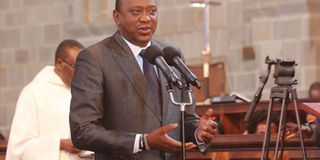Only urgent dialogue will save country from the fire next time

President Uhuru Kenyatta speaks to a congregation at All Saints Cathedral, Nairobi, on November 5, 2017. Everybody of sound mind will acknowledge that this year’s disputed elections have left us with a big problem. PHOTO | KANYIRI WAHITO | NATION MEDIA GROUP
What you need to know:
- Kenya is still recognised as a trailblazer almost unmatched in its commitment to democracy, constitutionalism and the rule of law.
- Calls for national dialogue must now extend beyond Mr Odinga’s quest for a seat on the political gravy train.
It really helps, sometimes, to be away from the constant din of Kenyan politics.
Even with the wonders of modern communications where news from home will still be at our fingertips, distance affords one the luxury of removing oneself from the daily news barrage.
That in itself is refreshing, rejuvenating and undoubtedly good for body and mind.
DEMOCRACY
The other advantage is that from afar, we can look on with detached interest, unbound from the ethnic blinkers and other irrational entanglements that make too many of us part of the problem rather than part of the solution.
Being away over the past week has allowed me to take a fresh look at the problems that every so often threaten to send our country hurtling down the precipice.
It has helped me to appreciate anew that Kenya is still a great country and not the basket case it is sometimes made out to be.
On the African continent, Kenya is still recognised as a trailblazer almost unmatched in its commitment to democracy, constitutionalism and the rule of law.
PUBLIC DEBATE
We have our problems, to be sure, but we are still a beacon of light in regard to those inalienable freedoms of speech, assembly, association, expression and media.
Independence of the Judiciary and other independent institutions, as well as clear limits to executive power, are principles that are well-established in Kenya and worth celebrating.
On the streets, markets, in pubs, government offices, nightclubs and conference halls of Ouagadougou, the capital of Burkina Faso, over the past week, I have invariably been accosted with questions about my country.
It seems like everyone from a street hawker on to lady of the night, journalist, corporate executive and highest-ranking government official knows that we have a problem.
CRITICISM
At the simplest level, they know that one Uhuru Kenyatta and one Raila Odinga are in a vicious competition for power and threatening to drag us all down the path of ethnic conflagration.
I have found myself pointing out that it is not as bad as it seems; that we are not about to go down the way of the 1994 Rwanda genocide or the Somalia anarchy.
I do not play the good ambassador out of a blind patriotism or misguided optimism.
I would be the last person to sugar-coat a bad situation simply to defend my country before foreign interlocutors.
Mine is to tell the truth as I see it, and probably being outside the toxic environment back home gives me the opportunity for a more clinically detached analysis of the situation.
ELECTIONS
My answers to the good people of Burkina Faso, clearly still the Land of Upright Man bequeathed by the legendary Thomas Sankara, comes with a big caveat:
We will prevail and regain our place as a stable, peaceful, democratic country, but only if we keep our heads and mature beyond blind obeisance to the tin gods.
If we don’t allow reason to rule, then we will hurtle down the dark abyss, and this time, there will be no salvation from foreign mediation.
Everybody of sound mind will acknowledge that this year’s disputed elections have left us with a big problem.
POLITICAL VIOLENCE
Fissures opened up not seen since the post-election violence of 2007-2008.
We stand reminded that settlements such as the Mwai Kibaki-Raila Odinga coalition government, which halted the bloodshed during that period, and the Uhuru Kenyatta-William Ruto Jubilee power-sharing and succession deal of today, were just temporary fixes.
Deep-seated causes for cyclic political violence were not resolved by the short-term deals.
Neither were solutions provided by the progressive Constitution of 2010, especially after we decided to sweep under the carpet the wounds from historical injustices and grievances, unequal development, marginalisation and the neglect of entire regions, and unfair distribution of national resources.
DIALOGUE
Those are the issues we need to talk about.
Calls for national dialogue must now extend beyond Mr Odinga’s quest for a seat on the political gravy train and the determination of Mr Kenyatta and Mr Ruto to continue eating alone in a perpetual Kikuyu-Kalenjin succession.
If we don’t take advantage of this window to have a serious national conversation, we will implode, and the fire next time, come the 2022 elections, will be Jubilee in violent internal spasms when one side that retains the threat of an irregular ethnic militia realises it has been conned.
Email: [email protected] Twitter: MachariaGaitho





